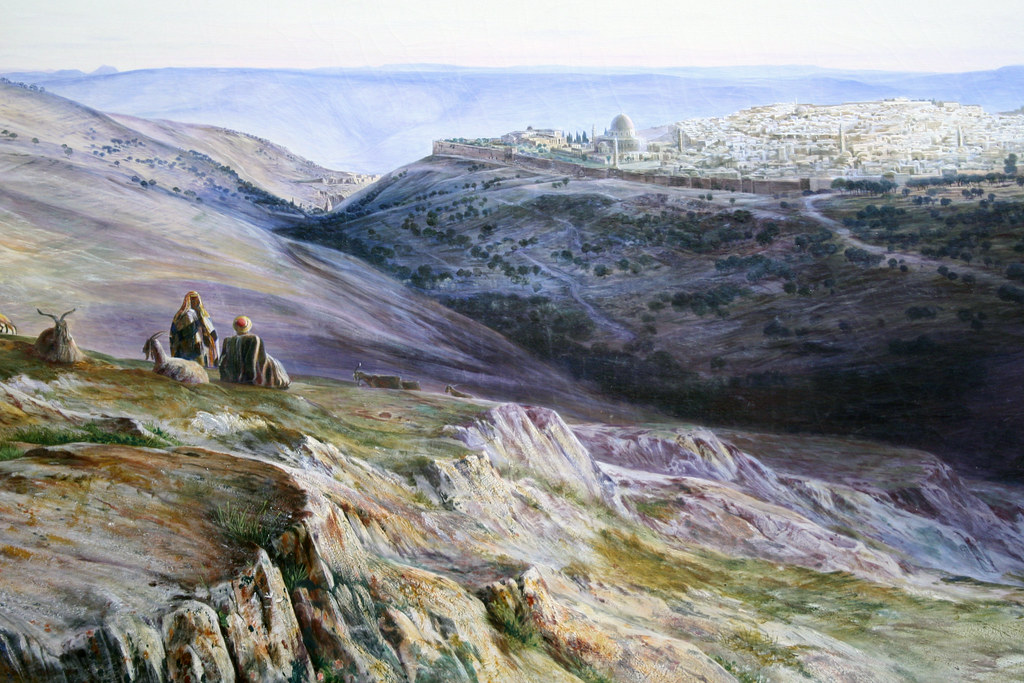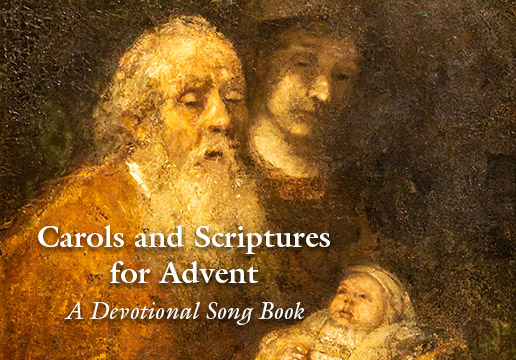
DECEMBER 17
View the Full Advent Calendar
Once in Royal David’s City
Artwork:
Jerusalem from the Mount of Olives by Edward Lear, (1859) is an oil on paper mounted on canvas. Housed in the Israel Museum, Jerusalem, Israel, Lear portrays a sprawling landscape view of a sunrise from the Mount of Olives in the 19th-century. Two reposed figures look upon the historical City of David in the distant background.
Carol Text: Cecil Frances Alexander, 1848
Carol Melody: Henry John Gauntlett, 1849
Piano accompaniment by Lezlie Taguding
![]()
Once in royal David’s city
Stood a lowly cattle shed
Where a mother laid her baby
In a manger for His bed
Mary was that mother mild
Jesus Christ her little Child
![]()
He came down to earth from heaven
Who is God and Lord of all
And His shelter was a stable
And His cradle was a stall
With the poor and meek and lowly
Lived on earth our Savior holy
![]()
And our eyes at last shall see Him
Through His own redeeming love
For that Child so dear and gentle
Is our Lord in heaven above
And He leads His children on
To the place where He has gone
“Do not let your hearts be troubled. You believe in God; believe also in me. My Father’s house has many rooms; if that were not so, would I have told you that I am going there to prepare a place for you? And if I go and prepare a place for you, I will come back and take you to be with me that you also may be where I am.”
- John 14:1-3
Advent Devotional
I’m told that from the Mount of Olives the sun sets over Moriah – the hill Isaac ascended carrying wood for sacrifice. In the distance, some six miles south of Jerusalem lies the little town of Bethlehem. With only a few hundred inhabitants in the first century, it was something of a sleepy suburb, an unwalled village, neither glamorous, cosmopolitan or secure. The burial place of Rachel, its fields of grain were gleaned by Ruth, its pure water treasured by David (2 Samuel 23:15).
The Messiah defied all expectations. He didn’t arrive in the royal palace of a big city but rather amidst the shepherds, farmers, and small households of Bethlehem. As the song tells us, Jesus stayed with the “poor and meek and lowly.”
Mary placed her newborn son “in a manger, because there was no guest room available for them” (Luke 2:7). This likely means that Joseph’s relatives were unable (or unwilling) to accommodate them in the sleeping quarters and so Joseph and Mary stayed amidst the household animals.
Forty days later, when Jesus was taken up to the temple, His parents couldn’t afford the cost of a lamb (Lev.12:8, Luke 2:24), and so they presented a pair of doves or pigeons instead. They didn’t offer a lamb at Jesus birth, but at his death, Mary would stand beside and watch the lamb of God sacrificed on that hill.
When Jesus came, there was no room for Him. Yet He goes to prepare a place for us. And there is room enough in the Father’s house (John 14:2). Jesus ascended the hill, carrying the wood, making a way and preparing a place so that He could take us to the Father.
Prayer
Lord,
be at home in my heart.
Prepare a place for Yourself here.
Grant me an awareness
of Your Presence.
May I be content in
and with You.

Dave Chaves
Technology and Product Development Manager, CSLI
Dave Chaves, Technology and Product Development Manager, has worked in nonprofit, Christian communications for over 10 years, including most recently with Five Talents USA. He holds a master’s degree from Georgetown University and an MDiv from Africa International University. He’s been involved in cross-cultural missions in East Africa for over 10 years and is an Associate Missionary with the Society of Anglican Missionaries and Senders. Dave met his lovely wife Lucy in Kenya and they have four children. He is excited to be part of the CSLI team and to support communications and technology to further the ministry of discipleship.




